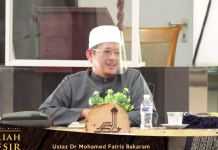This article is a summary of takeaways from Ustaz Dr Mohamed Fatris Bakaram’s Tafsir Online Lecture on 14th June 2020. Summaries of previous lectures on Surah Maryam and Surah Taha can be found here. This lecture is a continuation of last week’s lecture after Surah Al Anbiya’ verses 83 to 84.
Q&A: Should We Seek Treatment for Illness or Bear It Patiently?
Context and Question
Before I start today’s topic, allow me to address a question which was raised after last week’s tafsir lecture. We mentioned that Prophet Ayyub AS became a symbol of patience and steadfastness in enduring with faith the trials given to him. Prophet Ayyub had faced immense difficulty when his wealth, livelihood, children, and health were taken away from him. By Allah SWT’s Mercy, Prophet Ayyub had triumphed with patience. His prayers were answered when Allah SWT replaced whatever he AS had lost with Rizq of similar quality and quantity to that which had been lost.
Q: I have been told that a true believer does not seek medical aid when sickness befalls him. I learnt that we should instead take heed from Prophet Ayyub AS’ story, how he merely waited with patience and prayer for Allah SWT to remove his sickness and relief him off his hardship. I was taught that believers who seek medication or medical aid to deal with their sicknesses only have the faith of the common people. Muslims whose faith are of a higher level have such a high level of reliance, acceptance, patience, and trust in Allah that they do not seek treatment when they are sick. Is this opinion true?
Two Options
The answer, my dearest brothers and sisters, is that the concept of getting treatment for sickness has in fact been discussed by the scholars. In general, in Islam, when a believer is inflicted with an illness, there are two options that they may choose: to seek treatment or to choose not to.
Why People Choose Not to Seek Treatment
The reason for this is that there were Companions of the Prophet SAW who did choose the latter option. When sickness inflicted them, they would accept it with patience and put their complete trust in Allah SWT, until they have been cured. Amongst these people was Abdullah ibn Abbas RA. Choosing not to get treatment is something that is allowed in Islam based upon various evidence.
One of these sources is a hadith in Sahih Muslim. It was narrated that a woman had come to Rasulullah SAW asking for his supplication so that Allah SWT may cure her of her sickness. She was said to have been suffering from seizures or fits for a long time. The Prophet SAW replied to her saying that she had two choices; if she stayed patient with her sickness, she would be granted Paradise, and if she wanted him to supplicate for her, she would be cured. She RA chose to stay patient. These were the companions of the Prophet SAW, whenever they were asked to choose between Paradise and something else, they always chose Paradise. This companion chose to bear with the sickness in exchange for Paradise. However, she made a request for the Prophet to make supplication for her so that her clothes may not slip off and that her Aurah may not become exposed whenever she was to experience a seizure.
This hadith is used by scholars to show that in principal, it is not obligatory for a believer to seek treatment for their sickness. Other evidence to support this opinion is that there are hadith which mention that illnesses are a means of expiation for a believer’s sins. There is also a hadith saying that “when Allah loves a person, He tests him”. Scholars of this opinion say that for an ill believer, seeking treatment is permissible and bearing with it in hopes of attaining a reward, being expiated of sin, or attaining Allah’s Love is also permissible.
Three Situations Where Seeking Treatment is Obligatory
Scholars say that the above principal is applicable in the general context, for example when you catch a common cold or have a mild fever. There is a hadith that says, “For every sickness there is a cure” and also another one that says, “Seek treatment, but do not seek treatment by the unlawful (Haram)”. So, there is no obligation to seek treatment for as long as it is Halal, and no compulsion in seeking treatment as well. However, scholars say that when it comes to certain illnesses, there is no choice; seeking treatment and obtaining medication is obligatory. There are three situations in which this applies:
1. The illness impedes the fulfilment of your responsibilities
The first, is if the illness is preventing you from fulfilling your responsibilities. For example, if you are the head of the household and the breadwinner of the family and your sickness is preventing you from earning a living, then it becomes obligatory (wajib) for you to seek treatment for your sickness and be healed as soon as possible. Afterall, earning a living to provide for your family is wajib upon you. This is a principle that is applied in Islam; If there is one thing that causes a wajib deed to become imperfect/incomplete without it, then it also becomes wajib. For example, to perform Salat, you need to take wudhu’; since salat is wajib, wudhu’ also becomes wajib. So if you are sick and lying at home, unable to go to work, you cannot say that you don’t want to go to the doctor because treatment is optional and you want the rewards of staying patient. In this case, there is no choice, treatment is wajib so that you may recover and carry out your wajib duties.
2. The illness causes you to burden others
Secondly, if the illness results in you becoming a burden on others, treatment is obligatory. For example, you are not the breadwinner, you are a housewife. If you fall sick and your sickness extends into weeks and months, leaving your children and your home in disarray and resulting in your husband taking leave from work just to take care of the household, you cannot be stubborn and refuse treatment to “stay patient”. If the sickness is preventable and curable, then it is compulsory for you to get treated.
3. The disease is contagious
Lastly, if the sickness is contagious, then you cannot refuse immediate treatment. Avoiding the doctor in this situation might eventually lead to others getting infected with the sickness and cause harm to others. The evidence for this is a hadith in which Rasulullah SAW tells us that if there is a pandemic affecting a certain location, people from that location should not leave it and people from outside of it should not come in. There is another hadith in which Rasulullah SAW said, “Run from the Tho’un (a contagious sickness) as if you were running away from a lion”. These sources indicate that not only is it obligatory, it is also urgent and important for you to seek immediate treatment for a contagious disease.
Treatment is Encouraged in Islam
In general, there are a lot of hadith that show that Rasulullah SAW and his companions RA would themselves seek treatment whenever they fell ill. There are a portion of companions who chose not to seek medical aid and bear patiently with their sickness. However, in majority of the cases, Rasulullah SAW encouraged his companions to seek treatment. There is a hadith saying, “For every disease there is a cure, so seek treatment.”. Prophet Muhammad SAW did not only permit seeking treatment, in fact, he encouraged it.
Amongst the medicines that was widely used during the time of the prophet by the Arabs is the Habbatus Sauda (black seed). These seeds used to be consumed by the Arabs with the aim of preventing and curing sickness. Rasulullah SAW encouraged eating the black seed. In one hadith, Rasulullah SAW said, “Habbatus Sauda is the cure for every illness except for As-Saam (meaning death).”. Another treatment often used back then was Hijamah (cupping), a practice that existed even before the prophethood of Prophet Muhammad SAW. Rasulullah SAW himself was known to go for Hijamah treatment. If seeking treatment was not encouraged, then why would Rasulullah SAW have promoted the consumption of medicines and medical treatment? Islam in fact encourages treatment. So do not prevent yourself from seeking a cure from whatever sicknesses befall you.
Continuation of Surah Al-Anbiya’
Lesser-known Prophets and the Virtue of Patience
وَإِسْمَاعِيلَ وَإِدْرِيسَ وَذَا الْكِفْلِ ۖ كُلٌّ مِّنَ الصَّابِرِينَ
And (remember) Ismail, Idris, and Dhulkifli, all (men) of constancy and patience [21:85]
These three prophets were mentioned without a story to their names. Incidentally, these three prophets are not mentioned often in the Qur’an. We have learnt about the stories of many prophets (such as Prophet Musa, Prophet Ibrahim and Prophet Yusuf) through the narrations of the stories of their lives in the Qur’an. These three prophets, however, do not have many stories linked to them.
Prophet Ismail AS
What we do know about Prophet Ismail AS are from two stories. The first was with his mother, Sayidatina Hajar AS when she was left in the middle of the barren desert with Prophet Ismail who was still a baby. Baby Ismail had cried out of hunger and thirst and Sayidatina Hajar ran up and down Safa and Marwa searching for a water source. The story ended with water spouting out of the ground beneath Prophet Ismail AS, becoming the source of Zamzam water – water which continues to flow even today.
The other story we know of that involves Prophet Ismail was with his father, Prophet Ibrahim AS. While Prophet Ismail AS was still a child, Prophet Ibrahim AS had a dream of him slaughtering his son. He narrated this story to Ismail AS, who asked him to carry out Allah SWT’s command and slaughter him. This command turned out to be a test from Allah SWT. Right when the slaughter was about to be carried out, Prophet Ismail was switched out with a sheep and saved from being killed.
These are the only two stories linked to Prophet Ismail AS in the Quran. We do not know anything else about his childhood, his youth, his life, his struggles, his preaching to his people or how his people reacted to his message.
Prophet Idris AS
We have talked about Prophet Idris before. In our tafsir lesson of Surah Maryam, we talked about how Prophet Idris AS was someone who was honoured and raised high in status by Allah SWT and that he was a truthful man. We also mentioned that we do not find any stories about him in the Qur’an or hadith. If you revisit that lesson, you will find that I went through the Israeliyat stories linked to Prophet Idris AS. As previously mentioned, Israeliyat stories are stories that do not have an authentic source in Islam, are related to prophets of the past, are problematic in their essence (because they contradict what we know about the prophets), and are obtained from stories narrated in the books of the People of the Book (i.e. Jews and Christians).
We narrated the Israeliyat story where Prophet Idris AS was said to have requested to meet with the Angel of Death. He was claimed to have pitied the angel who carries the Sun and made supplication asking Allah SWT to lighten the angel’s load. Allah SWT answered Prophet Idris’ prayer and the angel found his load lightened. When the angel got to know that Prophet Idris was the cause of this, he met Prophet Idris to thank him. Prophet Idris was said to have asked the Sun Angel for a favour, asking to meet with the Angel of Death. He wanted to ask for a life extension. The Sun angel brought him to the point where the sun rose, to wait for him while he pre-empted the Angel of Death of Prophet Idris’ arrival. The Angel of Death reaffirmed the Sun Angel’s thoughts that Prophet Idris’ death was already predetermined and inevitable. As a consolation, he offered to tell Prophet Idris where he would die instead, perchance he may avoid it. The Sun Angel was informed that Prophet Idris’ life was to be taken when he was at the point where the sun rises. Hearing that, the Sun Angel rushed back to Prophet Idris only to find him already dead.
This is the Israeliyat story that we spoke of before. This story was neither mentioned in the Qur’an nor the Hadith. We reject the authenticity of this story not just because there are no genuine sources from our Islamic texts, but also because of the ridiculous implications these stories hold against Prophet Idris AS. How could a Prophet of God possibly be bargaining with the Angel of Death? There are of course many other Israeliyat stories relating to Prophet Idris AS, but I will not mention them. There is no need to know of them, many of which should not be believed.
Prophet Dhulkifli AS and the “Lesser-known” Prophets
Next, there is the mention of Dhulkifli AS, a prophet whose story is neither mentioned in the Quran nor in the hadith. There is a single hadith narrated by Imam Tirmidhi regarding him, but the chain of transmission is weak, and this makes its authenticity questionable.
My dearest brothers and sisters, in our study of the Prophets mentioned in Surah Al-Anbiya’, we have seen many stories of the lives of the prophets of Allah. Amongst them, we learnt about Prophet Ibrahim, who had to encounter a harsh ruler, Prophet Suleiman, who was himself a ruler of a large kingdom, and Prophet Ayyub AS, who was blessed with abundance and tested with immense difficulty and then triumphed through the trials. And then we come across Prophets for whom there really are no known stories to their names. There is no glory, honour, or fame to their names.
Patience: The Most Honoured Virtue
Yet, when Allah SWT mentioned the names of these three “lesser-known” prophets, He SWT said they were all people of patience. What we can take from this is that patience is a virtue that is honoured by Allah SWT, something that distinguishes these prophets from the rest of people, something that makes them worthy of mention.
We heard about the very long story of Prophet Ibrahim AS’ life – how he had a father who made idols, how he stayed on making Dawah to a disbelieving people, how he was sentenced to being burnt alive by a cruel king – was this not a story of patience? We talked about Prophet Lut AS when he dealt with a people who were stubborn in their disobedience and a wife who betrayed him, all of whom were eventually destroyed by Allah SWT, was this not a story of patience? Prophet Nuh AS preached the message of Allah for over 900 years, his own son and wife refused to accept Islam and ended up being wiped away with his people in a flood – this too was a story of patience.
Prophets Daud and Suleiman were great kings; Prophet Suleiman had a kingdom that included the Jinn and the birds – did they not show great patience? They had to remain patient in overcoming the advantages of great power, wealth and authority so that they may remain humble in prostrating to Allah SWT, remain grateful to Him SWT and remain steadfast in faith, not losing themselves to the perils of wealth power and fame. My dearest brothers and sisters, in hardship, a person must remain patient. In receiving blessings, a person must also endure patiently. With patience, a person’s faith will become his guide in ensuring that his wealth and ease does not lead him to become forgetful of Allah SWT, the Provider of the good that is received.
Going back to our last lesson on the life of Prophet Ayyub AS and the Israeliyat story linked to him. In the story, when Iblis had supposedly blown a horrible disease into Prophet Ayyub AS, he was said to have become resigned, sighing and complaining to Allah SWT, saying that it would have been better for his mother to have miscarried him than for him to have lived with such pain. How could this story have been true, considering that the prophets were honoured by Allah SWT for their patience and steadfastness – Prophet Ayyub AS was no exception to this. For this reason, we reject the Israeliyat story. In fact, we will see later in Surah Sad that Prophet Ayyub would be mentioned once more. In Surah Sad, Prophet Ayyub is praised for his patience, declared as being the best of Allah’s servants.
Dear brothers and sisters, whenever you come across any stories that imply the loss of patience in any of the prophets of Allah, be wary of them. These stories may imply a lack of patience in times of hardship, a loss of patience in ease, or a loss of patience against worldly desires; all of these stories are false – reject them.
Allah’s Mercy: The Key to Righteousness
وَأَدْخَلْنَاهُمْ فِي رَحْمَتِنَا ۖ إِنَّهُم مِّنَ الصَّالِحِينَ
And We admitted them into Our Mercy. Indeed, they were of the righteous. [21:86]
Allah SWT declared that these prophets were people of the righteous; they were people of goodness – they had good character, good hearts, good deeds and good thoughts. Allah SWT entered them into His Mercy.
If you notice in this Surah, there is a pattern; a prophet is mentioned, his characteristics are mentioned, and a summary is given. There is a link. When we looked at Prophet Ayyub’s story last week, we heard that Prophet Ayyub’s supplication was answered, his wealth and children were returned to him – all of this as a Mercy from Allah. Similarly, in this verse, Allah SWT is summarising the story of these three prophets with: because of their patience, we entered them into Our Mercy.
This is what we hope for, dear brothers and sisters. We do not want to triumph over trials through patience and then become boastful thinking that we have done well. We want to acknowledge that whatever good that we get, is solely out of Allah’s Mercy to us. This is the formula to follow: be patient, Allah SWT enters you into His Mercy, become amongst the righteous. If you are patient, and then forget the Mercy of Allah SWT, if you fail to get His Love, then you can forget about being amongst the righteous.
How many of us think of ourselves as strong and powerful, thinking that we have that resilience to succeed in life, and then we forget Allah’s Mercy? We forget to look for Allah SWT’s Love and Acceptance. We forget that whatever advantages and blessings that we have are in fact coming out of Allah SWT’s Mercy. These “blessings” at the end of the day are what will distance us from Allah SWT, stopping us from becoming amongst the righteous. There are many amongst us who are like this, who start off from a place of difficulty and then forget themselves, becoming arrogant and boastful, after achieving success and praise. These people eventually forget their roots and end up disobeying Allah SWT’s commands without feeling any guilt. La hawla wa la quwwata illa billah.
Upgrade your patience, learn from the prophets AS. But remember to stay humble with Allah SWT. Without Him, you would not have gotten success. At the end of the day, you want to raise your hands to Him and say, “O Allah, I have put in the effort to remain patient, and I still hope for Your Mercy.”. We hope that someday, Allah may sustain His Taufiq and Hidayah in our lives so that we may remain amongst the righteous people to the end of our lives. We want to be people who are bring ease and joy to the hearts, people who are always in the Love and Mercy of Allah SWT. That is what we hope for, may Allah SWT make us amongst the righteous.
Ameen.
Summary by: Arina Adom
Arina Adom is a lover of learning who takes on the world with an open mind. Resourceful and adaptable, always ready to take on new challenges. Comfortable working with diverse groups of people, yet able to work independently. Thrives under pressure. Currently seeking a meaningful career that enables her to impact lives directly and bring about positive changes in the lives of others in the community.
Arina graduated with a degree in Science ( Hons ), Life Science from NUS. She is currently taking a diploma in Quran and Sunnah Studies from Al Zuhri.
Watch Kuliah Tafsir again at
Masjid Darul Makmur’s Youtube
Watch and follow Kuliah Tafsir weekly
every Sunday after solat Maghrib
organised by Masjid Darul Makmur
Your contributions are appreciated. Get more details by clicking the image below.











